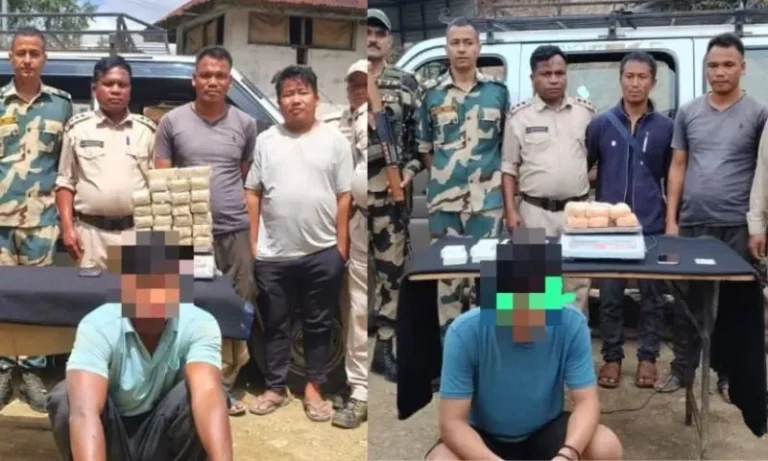Manipur Police Arrest Active KCP Militant for Extortion Activities at Imphal’s Lamsang: A Deep Dive into Security Challenges and Implications
Introduction
Have you ever wondered what it takes to keep communities safe from the clutches of organized crime and militancy? In Manipur, law enforcement has once again shown its mettle. Recently, the police arrested an active KCP militant involved in extortion activities at Imphal’s Lamsang area—a bold move that has rattled the underground networks and boosted public confidence. In this article, we’re going to unpack every detail of this operation, discuss its implications, and explore what it means for the region’s future. Buckle up as we delve into the heart of this story, using real-world analogies, engaging narratives, and a conversational tone that makes complex issues accessible to everyone.
Background on Manipur’s Security Landscape
Manipur, a state known for its rich cultural heritage and resilient spirit, has not been immune to the challenges of militancy and criminal activities. Over the years, various militant groups have sought to influence the socio-political environment, often resorting to extortion and other illicit practices to fund their operations. The KCP militant group, to which the arrested individual is linked, has been one of the more notorious players. Operating in the shadows, these groups have exploited local vulnerabilities, much like a parasite slowly draining the lifeblood of its host.
For many locals, these criminal activities have become a part of daily life, impacting everything from local business operations to community trust. Imagine living in a neighborhood where every day brings the constant worry of falling victim to extortion—that’s the reality for some communities in Manipur. This backdrop sets the stage for understanding why the recent police action is so crucial.
Understanding Extortion and Its Impact on Communities
At its core, extortion is not just a crime—it’s a tool used by criminal organizations to assert control over communities. Extortion involves coercing individuals or businesses into handing over money or resources under the threat of violence or other harm. Think of it as a relentless tax imposed by criminals, one that stifles growth and breeds an environment of fear.
In the Lamsang area of Imphal, extortion has had tangible, detrimental effects. Local businesses, already operating on thin margins, often find themselves forced to allocate funds to pay off these underground groups. This siphoning of resources not only disrupts economic activities but also erodes the trust that residents have in their own security. When extortion becomes rampant, the community’s collective spirit is diminished, much like a garden overrun by weeds that choke out the life of blooming flowers.
The Arrest Operation: A Closer Look
So, what exactly happened in Lamsang? The recent operation by the Manipur police was a carefully orchestrated effort, born out of months of intelligence gathering and surveillance. Law enforcement agencies had been tracking the activities of the KCP militant network, and through meticulous investigation, they identified a key player operating out of Imphal’s Lamsang region.
The arrest was executed with precision—a blend of strategy, timing, and courage. Picture a chess game where every move is calculated: the police anticipated the militant’s actions and intercepted him before he could inflict further harm on the community. In many ways, this operation was like watching a skilled goalkeeper block a powerful shot, protecting the goal (or, in this case, the community) from a potentially devastating blow.
Who Are the KCP Militants?
While the arrest itself is newsworthy, it also brings attention to the broader issue of militant groups operating in Manipur. The KCP, though not widely discussed in mainstream media, has been known to engage in activities ranging from extortion to more serious insurgent operations. These groups thrive in areas where law enforcement might struggle to reach every corner, much like how mold finds a foothold in the hidden crevices of an old building.
Understanding the modus operandi of such groups is crucial for several reasons. For one, it sheds light on the strategies they employ—using fear and intimidation to control communities and finance their activities. Secondly, it helps the police and policy makers tailor more effective countermeasures. In many respects, tackling militancy is like dismantling a complex machine: every cog and wheel must be understood, neutralized, and replaced with mechanisms that serve the greater good.
Implications of the Arrest for Law Enforcement
Every successful arrest sends ripples of reassurance through a community, and this case is no exception. For the Manipur police, the capture of an active KCP militant is more than just a victory over crime—it’s a symbol of their unwavering commitment to public safety. When police officers risk their lives on the front lines, their actions not only dismantle criminal networks but also rebuild the fractured trust between law enforcement and the community.
This arrest also highlights the evolution of police work in the region. Modern law enforcement is increasingly reliant on intelligence-led operations. Gone are the days when reactive measures alone could curb criminal activity; today’s police must be proactive, anticipatory, and ready to strike swiftly at the heart of criminal networks. It’s akin to a game of cat and mouse, where every move counts, and one well-timed pounce can change the entire dynamic of the game.
The Socio-Economic Impact on Local Communities
Extortion doesn’t just deplete financial resources—it also stifles economic growth and innovation. Local businesses in Lamsang, which form the backbone of the community, have long suffered under the weight of criminal extortion. Many entrepreneurs are forced to invest in protection money instead of expanding their ventures, creating a vicious cycle of dependency and stagnation.
Consider the story of a small family-run shop in Imphal. Instead of using profits to invest in new stock or expand services, a significant portion might be siphoned off to pay off extortionists. Over time, this reduces the shop’s potential to grow and, in turn, diminishes the overall economic vibrancy of the area. The arrest of a key militant could, therefore, be seen as a turning point—a moment that may eventually lead to economic revival as the oppressive grip of criminal networks loosens.
Political and Administrative Repercussions
When an operation of this magnitude takes place, it’s not just the police who take notice. Local and state-level politicians, as well as administrative bodies, are compelled to respond. The arrest of a KCP militant is likely to trigger debates in local government about strengthening security measures, reallocating resources, and possibly revisiting current policies on militancy and law enforcement.
Political leaders may seize on this moment to promise tougher measures and more comprehensive reforms. After all, public safety is a top priority for any administration. But beyond the political rhetoric, there’s a need for genuine, systemic changes. The arrest should serve as a catalyst for reviewing and revamping existing security protocols, ensuring that law enforcement agencies are equipped to deal with both traditional crimes and emerging challenges posed by militant groups.
The Role of Community Vigilance and Support
While police operations are critical, community vigilance plays an equally important role in combating extortion and militancy. In many ways, communities are the first line of defense. When residents band together, share information, and support one another, they create an environment where criminal networks find it increasingly difficult to operate.
Local leaders, neighborhood associations, and civic groups can work in tandem with the police. Consider community watch programs that function as the eyes and ears of law enforcement—these initiatives are like the branches of a tree, spreading wide to protect every part of the trunk. In regions like Lamsang, where extortion has eroded trust, re-establishing community solidarity is key to long-term security and growth.
Strategies for Preventing Extortion and Militant Activities
So, what can be done to prevent the resurgence of such criminal activities? It starts with a multi-pronged approach:
- Enhanced Surveillance and Intelligence Gathering:
Law enforcement agencies need to continue investing in technology and human intelligence. This means better surveillance tools, data analytics, and community informants who can alert authorities to suspicious activities before they escalate. - Community Engagement and Awareness Programs:
Educating the public about the dangers of extortion and the tactics employed by militant groups can empower communities to stand up against these practices. When people understand the true cost of extortion—both financially and emotionally—they are more likely to cooperate with police efforts. - Strengthening Legal Frameworks:
Robust legal measures that deter potential criminals are essential. This involves not only harsher penalties for those caught engaging in extortion but also streamlining judicial processes to ensure swift justice. - Economic Empowerment Initiatives:
Providing alternative sources of income and financial support to vulnerable communities can reduce their dependence on the illicit funds demanded by criminal networks. Think of it as cutting off the supply line of a well-oiled machine—if the community is economically resilient, the appeal of paying extortion money diminishes significantly. - Collaborative Efforts Between Stakeholders:
Lastly, there needs to be a concerted effort involving government agencies, NGOs, and local leaders. Collaboration is like weaving a safety net—a collective effort that leaves no single group vulnerable to the machinations of criminal networks.
A Closer Look at the Arrest: The Tactical Operation
Let’s dive a little deeper into the operation itself. The arrest was the result of months of persistent work by an inter-departmental task force. Intelligence from multiple sources converged to pinpoint the location and activities of the militant. On the day of the operation, officers moved in quietly, surrounding the area much like a pincer movement in military strategy.
The operation was swift and efficient. Law enforcement officials secured the scene, ensuring that the arrest did not escalate into violence—a testament to their training and commitment. Witnesses later described the scene as one of controlled precision, where every move was calculated to minimize disruption and maximize the chances of a successful intervention. This is not just a victory for the police—it’s a win for every citizen who dreams of living in a safer, more secure environment.
The Ripple Effect on Regional Security
The arrest of a key militant figure sends a strong message to both criminal networks and the general public. For the criminals, it’s a stark reminder that their activities are being closely monitored, and that their actions will have consequences. For the community, it reaffirms that the state stands with them, ready to confront even the most deeply entrenched criminal elements.
This event could potentially mark a turning point in regional security dynamics. With the dismantling of a key player in the extortion network, there is hope that similar operations will follow. Each successful operation builds momentum, creating a ripple effect that gradually weakens the grip of militant groups on the region.
Challenges That Lie Ahead
While the recent arrest is undoubtedly a step forward, it is important to recognize that the battle against extortion and militancy is far from over. Challenges remain, and law enforcement must continuously adapt to evolving tactics employed by criminal groups. Some of the key hurdles include:
- Deep-Rooted Cultural and Socio-Economic Factors:
In many cases, extortion thrives in environments where economic hardship and social disenfranchisement are prevalent. Addressing these issues requires more than just police work—it calls for comprehensive social reforms. - Resource Limitations:
Despite their best efforts, police forces in the region often face challenges related to manpower and technology. Ensuring that they have the resources necessary to track and apprehend criminals is an ongoing battle. - The Evolving Nature of Militancy:
Militants are constantly changing their tactics to stay one step ahead of law enforcement. This cat-and-mouse game means that police must be equally agile and innovative in their approach, always ready to counter new threats as they arise. - Community Distrust and Fear:
Years of extortion and criminal activities have left scars on many communities. Rebuilding trust takes time and consistent effort from both law enforcement and community leaders.
Policy Recommendations and Future Directions
For long-term success, policymakers need to consider a range of strategies that go beyond reactive measures. Here are some recommendations:
- Invest in Technology:
Upgrading surveillance systems, utilizing data analytics, and deploying modern communication tools can help predict and prevent criminal activities. Imagine having a weather forecast for crime—advanced technology can help law enforcement anticipate and prepare for potential threats. - Enhance Training Programs:
Continuous training for police officers on modern investigative techniques and crisis management is crucial. Just as athletes train to stay at the top of their game, law enforcement personnel must be equipped with the latest skills to handle dynamic situations. - Foster Public-Private Partnerships:
Collaboration between government agencies and private enterprises can lead to innovative solutions for community safety. Businesses, too, have a stake in the stability of the region and can contribute resources or expertise in areas like cybersecurity and financial monitoring. - Implement Comprehensive Community Outreach:
Regular dialogues between law enforcement, local leaders, and citizens can foster an environment of transparency and mutual support. Town hall meetings, local workshops, and public awareness campaigns are all part of creating a resilient community. - Address Socio-Economic Disparities:
Ultimately, reducing the appeal of extortion requires creating opportunities for economic growth and social development. Programs that provide vocational training, education, and financial assistance to at-risk communities can help break the cycle of dependency on illicit networks.
Real-Life Stories: Voices from the Community
Let’s take a moment to reflect on how these events resonate with everyday people in Manipur. Many residents have shared stories of hardship—of business owners who lost profits to extortion, of families living in constant fear, and of young individuals whose dreams were curtailed by the oppressive environment. These narratives are more than just statistics; they are real-life testimonies that highlight why this arrest is a beacon of hope.
One shop owner from Lamsang remarked, “For years, we lived under the shadow of extortion. Every day was a struggle to keep our business afloat. Seeing the police take action gives us a glimpse of a future where we can work without fear.” Such voices, echoing through the streets of Imphal, remind us that behind every news headline is a community yearning for change.
Comparing Past and Present: A Shift in Strategy
Historically, efforts to curb extortion in the region were often reactive—responding to crimes after they occurred. Today, however, there is a noticeable shift towards proactive measures. Law enforcement is now more focused on intelligence gathering, strategic planning, and community engagement. This evolution is not only necessary but also inspiring. It’s similar to upgrading from a flip phone to a smartphone—suddenly, you have a suite of tools at your disposal that can make a world of difference.
International Perspectives and Regional Comparisons
Interestingly, the challenges faced by Manipur are not unique. Many regions around the world grapple with similar issues—where extortion and militant activities undermine economic development and community trust. By comparing strategies from different parts of the globe, Manipur can adopt best practices that have worked elsewhere. For example, community policing models in certain European countries have successfully reduced crime rates by fostering close relationships between the police and local residents. Adopting such models could serve as a valuable lesson for the region.
The Importance of Sustained Efforts and Vigilance
One successful operation does not signal the end of the problem. Instead, it should be viewed as a milestone in an ongoing journey. The fight against extortion and militancy is a marathon, not a sprint. Continuous vigilance, adaptive strategies, and strong community ties are essential to ensure that the gains made today are not eroded by tomorrow’s challenges. Just as a gardener must tend to their plants regularly to prevent weeds from taking over, law enforcement and community leaders must consistently work together to keep the environment safe and nurturing.
Conclusion
The arrest of the active KCP militant in Imphal’s Lamsang area is a powerful reminder that concerted efforts by law enforcement, combined with community support, can make a real difference. While the operation itself was a tactical victory, its true significance lies in the message it sends—criminal networks will not be allowed to undermine the progress and prosperity of Manipur. As we look forward, the focus must remain on proactive measures, sustained community engagement, and policy reforms that address the root causes of such criminal activities.
This case, with its myriad implications, invites us to reflect on the broader challenges of ensuring public safety in volatile environments. It teaches us that every arrest is not just a number on a police report, but a step toward reclaiming peace, rebuilding trust, and paving the way for a future where every citizen can live without fear.
Let this operation be a call to action—a rallying cry for all stakeholders to work together in the relentless pursuit of justice, stability, and progress.
FAQs
- What led to the arrest of the KCP militant in Imphal’s Lamsang area?
The arrest was the result of an intelligence-led operation by the Manipur police, which meticulously tracked the activities of the KCP militant network involved in extortion. Strategic planning and community inputs played a crucial role in pinpointing the suspect’s location. - How does extortion impact the local communities in Manipur?
Extortion drains financial resources from local businesses, fosters an atmosphere of fear, and hinders economic growth. This criminal practice forces residents to pay illicit “taxes,” reducing their ability to invest in personal and community development. - What strategies are being used by the police to combat militancy and extortion?
Modern policing in Manipur includes intelligence gathering, advanced surveillance, proactive operations, and strong community engagement. These measures ensure that law enforcement remains one step ahead of criminal networks, similar to anticipating moves in a strategic game. - How important is community involvement in preventing crimes like extortion?
Community vigilance is vital. When residents, local leaders, and law enforcement collaborate, it creates a robust safety net that deters criminals. Engaged communities can provide critical information and support, making it difficult for extortion networks to thrive. - What future steps are recommended to further improve security in regions like Lamsang?
Future efforts should focus on enhanced technology for surveillance, comprehensive community outreach, economic empowerment initiatives, and stronger legal frameworks. By addressing both the symptoms and the root causes of extortion, Manipur can build a safer and more resilient society.



